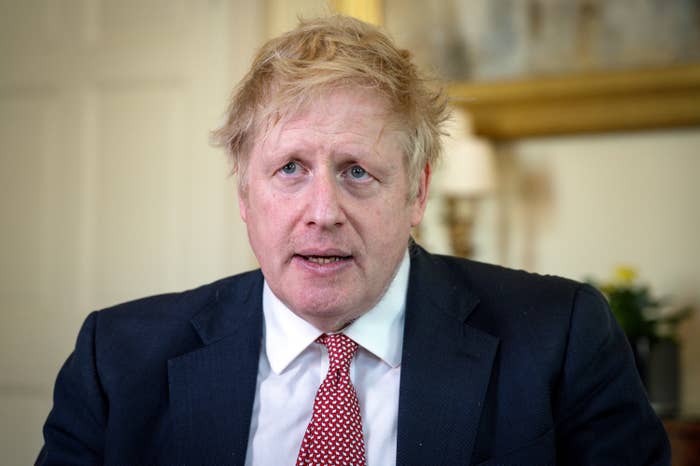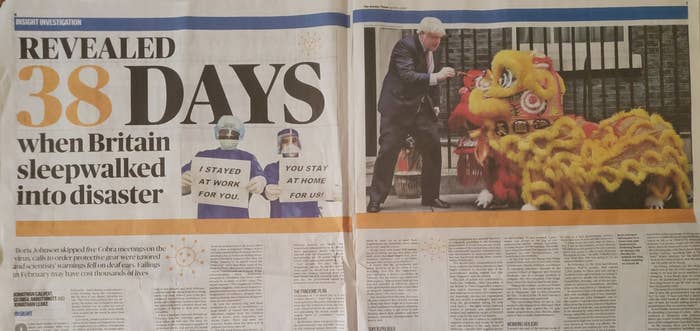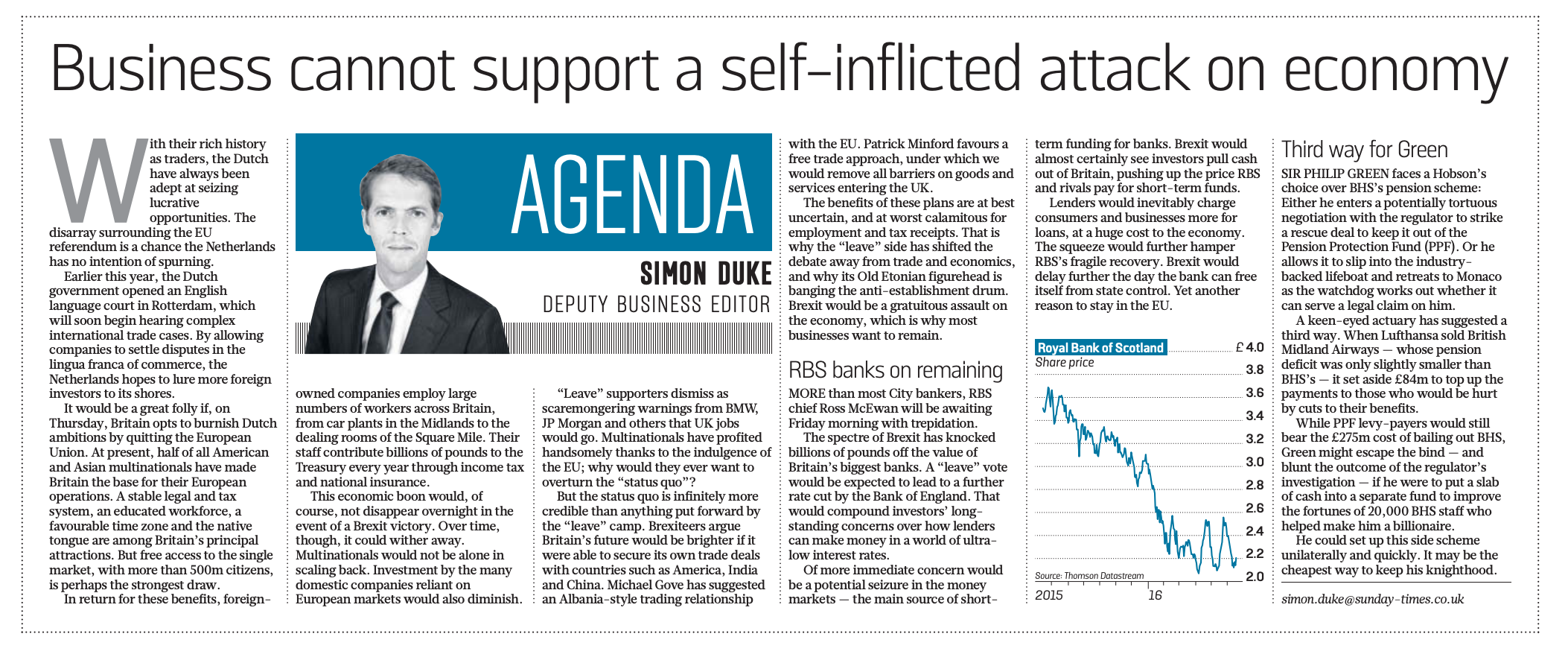
The Sunday Times newspaper backed Brexit four years ago and last summer it cautiously welcomed the prospect of Boris Johnson becoming prime minister, arguing “the United Kingdom could do with his sunny optimism” in a leader article highlighting the importance of his first hundred days in Downing Street.
But in those first hundred days it was Rupert Murdoch’s flagship Sunday broadsheet — the paper that leads the weekly agenda in Westminster more often than any rival — that rained down three heavy blows on Johnson.
Lurid claims of impropriety involving American tech entrepreneur Jennifer Arcuri (denied by Johnson), allegations that Johnson once groped the paper’s columnist Charlotte Edwardes (also categorically denied), and a damaging leak of the government’s no-deal “Operation Yellowhammer” documents set the paper on a strikingly different course from its Conservative-leaning coverage of the last few years.
Last weekend came another big swing, which BuzzFeed News can reveal led to almost half a million pounds in new annual revenue for the paper.
The once symbiotic relationship between Johnson and the Sunday Times has “irretrievably broken down” after an investigation published by the paper that criticised the prime minister for his handling of the coronavirus crisis, according to interviews with multiple sources at Sunday Times and in government.
The story by the paper’s “Insight” team went viral online and won plaudits from government critics who saw it as a return to the forensic investigative journalism for which the Sunday Times was historically well-known.

The story had 1.3 million unique views on the Times website, only 180,000 of which were subscribers, according to an internal email seen by BuzzFeed News. (Non-subscribers can read two stories a week if they register their details.)
Staff were told on Friday that more than 1,400 people subscribed to the Times and Sunday Times by clicking a link directly on that article, paying £26 a month, meaning over £430,000 in new revenue per year if people retain their subscriptions.
But the article provoked genuine fury in Downing Street and attracted an unusual on-the-record rebuttal from the government in a lengthy blog outlining what it saw as “falsehoods and errors”.
The suggestion in the story that it was unusual for the prime minister to have "skipped" five Cobra meetings at the start of the coronavirus outbreak was described by Johnson's team as "wrong". The government also insisted there were factual errors in the article about the provision of personal protective equipment for NHS staff and the threat level given to the virus back in January.
A senior Whitehall source argued that personal attacks on Johnson from sources in the piece showed political motivation rather than fair criticism. The Sunday Times will publish a further response to the government's rebuttal in this weekend’s paper, BuzzFeed News has learned.
British politics is changing quickly — the UK’s relationship with Europe post-Brexit remains unresolved, the Labour Party has a shiny new leader, and the long-term consequences of the coronavirus are wide-ranging and unpredictable.
The Sunday Times is changing too, as several senior staff members depart and it moves closer to a merger with the daily Times operation under a new editor with a vision to modernise, attract a younger audience and, according to sources on the paper, transform it into a premium, politically liberal brand like the New York Times.
All these developments raise the prospect of major upheaval at the intersection of media and politics, with questions about the future direction of one of Britain’s most influential news organisations, and challenges for Johnson’s government on its future communications strategy and its ability to connect with a vital demographic of voters.
In January, Emma Tucker was named as the Sunday Times’ new editor, replacing Martin Ivens, who had published the Arcuri, Edwardes and Yellowhammer stories.
The news was broken in a late-night tweet by the BBC’s Amol Rajan while Ivens was at a boozy party held by the Spectator magazine attended by prominent politicians and journalists, causing chaos in the room as tipsy colleagues from the industry speculated about what the announcement meant for the paper.
Tucker was previously the deputy editor of the sister daily, The Times, which under the editorship of John Witherow, opposed Brexit and had been more critical of Johnson in its leaders than its stable mate.
Tucker is seen as an ally of Witherow — who edited the Sunday Times himself from 1994 to 2013 when Murdoch appointed him editor of the daily — but the pair have very different approaches, insiders said.
While Witherow remains determinedly print-focused, Tucker was highly engaged in the paper’s digital output and product development.
The Times and the Sunday Times are run as two separate papers with different editors and different news desks. However some sections are combined, including travel, home and sport.

Multiple sources told BuzzFeed News that the papers are expected to pool resources more and more — and in the very long term, eventually fully merge.
They said Tucker and Witherow had a goal of ultimately turning the Times brand into a London version of the New York Times, both in terms of its politics, its status among readers, its focus on investigative journalism and on holding power to account.
“In the long term I’ve heard people say it should be a cool upmarket brand like the New York Times in America — you want to be seen with a New York Times bag,” one insider said.
The paper — associated with liberal metropolitan Americans — is one of the few commercial success stories in international print media, generating huge profits thanks to millions of paid subscribers as well as successful podcasts and events.
The Times recently launched a daily news podcast called Stories Of Our Times, while ‘Times Radio’ will begin broadcasting soon after its launch was delayed by the coronavirus.
“Being a Times subscriber should be like being a member of the National Trust, rather than a Private Eye subscriber where it just turns up in your letterbox and then you put it in the bin,” an insider said. “You don’t just read it, you listen to it, watch it, attend the events, buy the merch.”
A key component of this offer to readers involves putting investigations and hard-hitting journalism front and centre of the coverage, insiders claimed, as the Sunday Times has done in the past.
Under Harry Evans, who sat in the editor’s chair between 1967 and 1981, the paper became famous for its crusading investigations. These included exposing Kim Philby as a Soviet spy and highlighting the plight of children born with birth defects caused by the drug thalidomide, who never received compensation.

These stories were published by the paper’s notoriously secretive Insight investigative team — one former Sunday Times journalist said very few colleagues know what the team is working on at any time.
More recently the paper has become better known for exposing corruption in the world of sport, publishing bombshell investigations into the use of performance-enhancing drugs in professional tennis and cycling, as well as exposing the “cash for votes” scandal in the FIFA World Cup bidding process.
In the last few months, the Insight team seems to have turned its focus onto domestic politics more, with the coronavirus story, the Arcuri investigation, as well as an exclusive interview with a “confidante of Boris Johnson’s first wife” who made further incendiary allegations against Johnson.
The Yellowhammer leak was published by other journalists on the paper, and Charlotte Edwardes’ allegation against the prime minister was made in a self-authored column.
Any merger between the Times and Sunday Times — which multiple insiders think is the long-term direction of travel — will also increase pressure to have a common editorial line.
The Times has turned a small profit in recent years after the successful introduction of a paywall, whereas the Telegraph, which is firmly pro-Brexit and pro-Johnson, has struggled financially.
“Their readers are dying,” a Sunday Times journalist said. “Our reader is not as old as the Telegraph reader but we do need to attract some younger subscribers too. That’s what I think Emma will do and is really good at.”
Another insider disagreed, arguing that under Ivens — despite the flurry of stories which made grim reading for Johnson and his government — the paper was “perfectly in step with a type of Middle England aspirational middle class: just about Tory and just about Brexit.”
Friends of Tucker confirmed that she differed politically from Ivens, and wanted to make her own mark on where the paper stood on the political spectrum. “Emma is a liberal,” a Sunday Times insider said. “She is a massive change from before on a personal level.”
While Ivens was pro-Brexit and generally more supportive of the Johnson government, Tucker strongly believed that the UK should remain in the EU and is much more of a centrist than a true blue Tory, they said.
A former colleague said: “I’ve known Emma for many, many years and I like Emma a lot, but I have to say I was surprised about the decision to make her editor of the Sunday Times as she makes Lionel Barber look like a Brexiteer,” referencing the former editor of the Financial Times.
Despite her cooler view of his government, Tucker is well-connected to the Johnson family: she is close friends with Rachel Johnson, the prime minister’s sister, who was a vocal critic of her brother’s Brexit policy and stood as a candidate for the short lived anti-Brexit party Change UK.
Those familiar with her thinking said that readers could expect to notice differences in the paper’s coverage and tone.
Deputy editor Sarah Baxter, who had been one of the paper’s most prominent pro-Johnson voices, is leaving the paper in the summer, BuzzFeed News can reveal.
Just saying ... give Boris a go! https://t.co/e3v7ujH6mT
Eleanor Mills, the editor of the Sunday Times Magazine, is also leaving, it was reported last month.
“[Tucker] will make the changes she thinks she can get away with, but she won’t turn it into the Guardian" an insider said. "If she thinks Rupert isn’t on board with something she won’t do it."
Several sources on the paper said they suspected she would make her views felt via the comment pages. They all questioned whether the Sunday Times’ contrarian columnist Rod Liddle would remain on staff long-term given, as one insider put it: “Rod Liddle is the epitome of everything Emma hates.”
When Ivens was editor back in 2016, the paper backed a Leave vote, though one journalist in the newsroom at the time says most at the paper voted to stay in the EU.
“Our sister paper The Times went the other way, so people were scratching their heads a bit. We were surprised and we were disappointed, but we weren’t angry, because we kind of get it.”
The Sunday Times leader article argued that voting Leave “may be the best opportunity we shall ever have to call a halt to the onward march of the centralising European project”.
But even within the physical edition of the paper that day in June 2016 the picture was nuanced — an article by acting business editor Simon Duke said “business cannot support a self-inflicted attack on the economy”.

Curiously though, the text of this article is now different on the online version of this article — the headline is more generic, and the descriptions of Brexit as a “folly” and a “gratuitous assault on the economy” have been attributed to “business” and “business leaders,” whereas in print they came directly from Duke.
These subtle changes and differences, even within sections of the same paper, are signs of the delicate tightrope that the paper has walked in recent years as it has covered the most divisive political event in recent British history.
Sunday Times political editor Tim Shipman has been perhaps the best known chronicler of the Brexit era, writing two bestselling books on the topic and publishing countless front page articles for his newspaper, drawing on extensive contacts at the heart of government.
But there is, as one insider put it, a “separation of powers” at the paper between its political team and the reporters who worked on some of the paper’s other main scoops from the last year.
Asked about this on Twitter, he responded that he was not named as a contributor to the coronavirus investigation because he had been “writing about the future”.
“There’s clearly quite a division in reporting at the paper,” one Sunday Times journalist told BuzzFeed News. “I think it’s important you have both types of journalism going on, it’s quite helpful to have people in the Westminster bubble and outside.”
Shipman’s stories have caused headaches for Downing Street in recent weeks, most dramatically in February when a senior source briefed his Sunday splash that Johnson was preparing to scrap the BBC licence fee, only for it later to emerge that the prime minister was at odds with his chief aide Dominic Cummings over the proposal.
One insider said the paper could become increasingly sympathetic to the Labour Party under the leadership of Sir Keir Starmer, even suggesting a possible moniker: 'The Starmer Times'.

His predecessor Jeremy Corbyn, and his brand of left-wing politics, were seen as anathema to Sunday Times readers and journalists. Starmer is seen as more palatable by senior figures on the paper.
Starmer’s first article after being elected leader on April 4 was written for the newspaper, attracting criticism from Labour supporters for writing an article behind a “Murdoch paywall”.
But one insider suggested the article may be a subtle sign of a longstanding rift being smoothed over.
In his previous role as Director of Public Prosecutions, Starmer oversaw the investigation into the phone-hacking scandal which involved the News Of The World, a Murdoch publication.
Editor Rebekah Brooks was charged but eventually cleared — and is now chief executive of News UK, the parent company of the Sunday Times.
Murdoch personally remains on very good terms with Boris Johnson, a News UK source told BuzzFeed News, and the pair last saw each other in December after the Conservatives’ election victory.

One Sunday Times insider warned against trying to read “deep Murdoch-y motives” to the coronavirus story. “Insight just found a good story — there isn’t that sort of day-to-day intervention, though I’m sure conversations are had sometimes".
But Johnson’s allies believe the story was a politically motivated “hatchet job” that all but ended Downing Street’s existing relationship with the paper. "It is all about Brexit," one argued, insisting: "The piece was littered with quotes attacking the PM personally, accusing him of being lazy and bashing us over 'austerity', while omitting the facts we laid out in our rebuttal. It was plainly politically motivated."
While the Sunday Times was previously often Johnson’s favoured outlet for a set-piece interview or a major policy announcement, that looks likely to change following the Arcuri and Edwardes stories, and the coverage culminating in the Insight long-read.
“It is hard to see how our relationship with the paper can continue as it has,” a senior Conservative told BuzzFeed News. “The Sunday Times is now probably the most hostile paper to the government, more so than the Mirror or the Guardian.”

